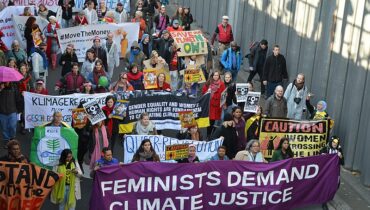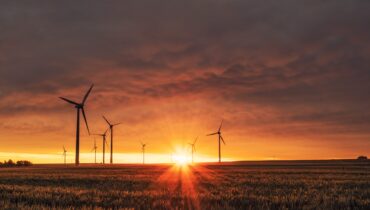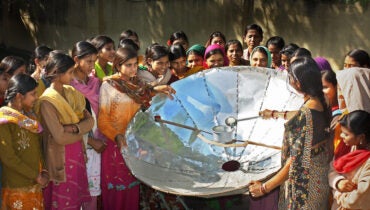With global temperatures shattering records and extreme weather impacting people around the globe, this year’s UN climate change summit represented a pivotal opportunity to correct course and accelerate action to tackle the climate crisis. COP28, short for the 28th meeting of the Conference of the Parties of the UN Framework Convention on Climate Change (UNFCCC), was hosted by the United Arab Emirates (UAE) in Dubai from November 30 to December 12, 2023. Negotiations ran until December 13, before Parties reached consensus on the phrasing of an agreement to “transition away from fossil fuels”—the first such agreements in 28 years of COP.
A delegation from the Georgetown Institute for Women, Peace and Security (GIWPS) joined more than 70,000 delegates, including leaders from governments, businesses, NGOs, and civil society to find concrete solutions to the defining issue of our time. GIWPS and partners hosted and participated in several events that aimed to center women in global conversations on climate change and explore inclusive approaches to addressing climate-related risks. Some of the main topics discussed at COP28 included (1) the links between relief, recovery, and peace; (2) the operationalization of the Loss and Damage Fund; (3) the special circumstances facing Small Island Developing States (SIDS); (4) results from the first Global Stocktake; (5) the need for a just transition to renewable energy; and (6) the meaningful inclusion of women and youth in climate negotiations.
COP28 Highlights
For the first time in the history of COP, the conference featured a thematic day on “Relief, Recovery, and Peace.” The Declaration on Climate, Relief, Recovery, and Peace was ceremoniously launched on December 3, 2023, and called “for bolder collective action to build climate resilience at the scale and speed required in highly vulnerable countries and communities, particularly those threatened or affected by fragility or conflict, or facing severe humanitarian needs, many of which are Least Developed Countries and Small Island Developing States.” This declaration responds to evidence that 2022 was one of the warmest years on record, signaling the arrival of what has been termed the era of “global boiling.” At the same time, the world is also witnessing a rise in conflict; 2022 saw the highest number of violent conflicts since the Second World War.
While the relationship between climate change and deadly conflict is complex and context-specific, it is widely accepted that gender inequality and climate change are interconnected. Climate change is already increasing food insecurity, water scarcity, and resource competition. In turn, violent conflict and political instability are contributing to climate insecurity and environmental degradation. The combination of these factors is disrupting livelihoods and spurring migration. Around the world, more than 110 million people—most of whom are women and children—have been displaced because of a combination of conflict, violence, the effects of climate change, and disasters. Today, 70 percent of the countries most vulnerable to climate change are also the most fragile. “Despite this, people living in extremely fragile states receive a fraction—up to 8 times less—of climate finance compared to those in non-fragile states,” noted Ambassador Al Suwaidi, COP28 Director-General.
Further, in a historic move, a loss and damage fund was agreed to at the opening plenary of the first day of the COP28 summit. Last year, women took the lead on one of COP27’s most contentious and challenging issues: climate reparations, the third pillar of international climate change governance, usually referred to as “loss and damage” (L&D). The concept of loss and damage refers to compensation for impacts of climate change that are so severe they cannot be adapted to, such as the destruction of homes, heritage sites, and even lives. Establishing a L&D fund was a major breakthrough after more than 30 years since vulnerable nations first identified this need. There is, nevertheless, a huge caveat to the agreed deal, as the $700m pledged so far by wealthy nations most responsible for the climate emergency covers less than 0.2% of what is needed every year. Grappling with “losses and damage” globally will require $894 billion annually by 2030, with more than $340 billion needed just for developing countries.
COP28 also resulted in the adoption of the 2023 AOSIS (Alliance of Small Island States) Leaders Declaration, which notes that Small Island Developing States (SIDS) face unique social, environmental, and economic vulnerabilities and remain a special case for sustainable development. Among SIDS, advocacy efforts at COP28 prioritized a just and equitable energy transition as a vital element of climate action and sustainable development.
COP28 was also noteworthy for marking the conclusion of the first-ever Global Stocktake – a process for countries and global stakeholders to assess where they are collectively making progress towards meeting the goals of the Paris Agreement – and where they are not. Legally binding, the international treaty was adopted in 2015 at COP21 in Paris, and set ambitious goals to limit greenhouse gas emissions through nationally determined contributions, or “NDCs.” The Global Stocktake is intended to inform the next round of climate action plans under the Paris Agreement to be put forward by 2025. The United Nations already published its report summarizing the stocktake findings in September, concluding that the world is falling short of its Paris goals. Packaged as a part of the “UAE Consensus,” the agreement on the global stocktake reached at COP28 includes language on transitioning away from fossil fuels to achieve net zero by 2050. This marks a critical milestone in UNFCCC history, though many agree that it is not forceful enough to prevent 1.5°C (2.7°F) of warming. Furthermore, as many commentators, including GIWPS agreed, Global Stocktake efforts must not only advance climate action, but also gender-just and youth-inclusive climate policies and programming.
Relatedly, the high-level dialogue on gender-just transitions culminated in the announcement of a new Gender-Responsive Just Transitions and Climate Action Partnership from the COP28 Presidency, which was endorsed by over 60 Parties. The Partnership contains a package of commitments, including actions on data, finance, and equal opportunities. Implementation will be reviewed at a second convening during COP31. While the gender balance of party delegations remained skewed, with 38% of representatives being women, representation was up from 35% at COP27. Among the COP28 delegates was a small group of powerful women voices, including President of the EU Commission, Ursula von der Leyen; Prime Minister of Barbados Mia Mottely; Prime Minister of Denmark, Mette Frederiksen; President of Honduras Iris Xiomara Castro Sarmiento, and Prime Minister of Iceland, Katrín Jakobsdóttir. In effect, since 2008, when the Gender Climate Tracker started compiling data on gender-responsive climate action, there has been an increase in women’s participation in climate negotiations, both in overall participation and at the highest levels of decision-making.
Additionally, a Global Youth Statement synthesizing the collective climate policy demands and proposals of young people was provided to the UNFCCC and COP28 Presidency by YOUNGO, the official children and youth constituency of the UNFCCC. The statement included demands for a “just, equitable and secure transition to a fossil fuel phase-out” and more financial support for vulnerable communities to address the impacts of climate change. COP28 and YOUNGO also launched the first-ever Youth Stocktake, a comprehensive analysis of youth involvement in climate diplomacy that presents a strategic blueprint to enhance youth participation in the COP process.
GIWPS at COP28
The GIWPS has promoted inclusive climate action and advocated for gendered perspectives at the COPs for several years. At COP26 in Glasgow, GIWPS hosted a panel on “Sustainability, Equality, and Peace: Integrating the Climate Change and WPS Agendas,” which explored how policies, investments, and local interventions can leverage the contributions of women on the frontlines of climate-related security risks. The following year at COP27, GIWPS continued this conversation through a panel focused on “Inclusive Approaches to Climate & Security: Centering Women in Local Adaptation Efforts.” This side event applied a gender lens to local-level adaptation to demonstrate the barriers women face accessing materials and resources for adaptation measures while also explaining how they are uniquely placed to be key actors in implementing innovative adaptation strategies to climate change. It was encouraging to see the importance of these issues and themes more prominently reflected this year at COP28. This year’s conference was the first time that the link between climate change and peace and security was formally recognized, as reflected in the Day 3 theme, “Relief, Recovery and Peace,” and “inclusion” was recognized as a cross-cutting priority theme throughout the COP.
GIWPS continued our engagement with these critical themes by co-hosting and participating in several events that focused on catalyzing inclusive approaches to climate action. From investing in the climate response of local women on the frontlines of climate impacts to high-level panels on what a gender-just transition could look like, GIWPS joined partners to convene critical discussions that centered women in today’s most pressing climate issues.
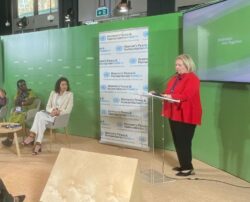
On December 3, 2023 Ambassador Melanne Verveer, Executive Director of the Institute, delivered remarks at a panel event entitled, “Investing in Women, Investing in Climate Security – Local Women’s Climate Response on the Frontlines,” hosted by the Women’s Peace and Humanitarian Fund (WPHF) and Germany. The event was held under the theme of “Relief, Recovery, and Peace” at COP28 and featured a panel of grassroots women activists working on the ground in Colombia and the Democratic Republic of the Congo to implement climate resilience initiatives. At this event, WPHF and Germany announced the launch of the Climate Security Funding Appeal, which will invest in women’s organizations that are working to respond to the impacts of climate change and climate-related conflict in their communities and beyond. Ambassador Verveer applauded this initiative, saying, “The growing climate crisis can also be a moment of opportunity if we invest in women working for peace and climate action.” This event exemplified the collective power of women’s organizations and civil society to effectively respond to climate shocks if they receive the necessary support and investments to do so.
Watch the full recording here.
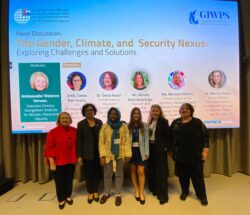
Also on “Relief, Recovery and Peace” day, GIWPS partnered with the Emirates Center for Strategic Studies and Research (ECSSR) and the COP28 Presidency to host a panel event entitled, “The Gender, Climate and Security Nexus: Exploring Challenges and Solutions.” The panel featured experts from the UN, civil society, and academia who offered perspectives and examples from their own work to illustrate the interdependence of climate change, gender equality, and peace and security, and gave insights on how to better integrate these agendas. US Ambassador-at-Large for Global Women’s Issues, Dr. Geeta Rao Gupta, framed the discussion with poignant remarks on the importance of addressing these issues intersectionally.
“It is exceptionally clear that the critical role of women in achieving climate security, climate resilience, and peace in the context of climate-related disasters cannot be overlooked. Not anymore,” she said.
During the event, Dr. Marisa O. Ensor, Senior Climate Research Fellow at GIWPS, discussed the Institute’s new report, “The WPS Index and the Gender, Climate and Security Nexus.” The report draws on findings from the WPS Index demonstrating the relation between women’s status and climate risks: countries where women fare better are also more resilient to climate change. Panelists echoed this conclusion. Renata Koch Alvarenga, Director of EmpoderaClima pointed out, “Women and children are over 14 times more likely to be killed by climate-fueled disasters.” Similarly, “We need to invest more in women, young people, and children and steer the wheel of our lives around climate,” remarked Nisreen Elsaim, Former Chair of UN Secretary-General’s Youth Advisory Group on Climate Change and Former Chair of Sudan Youth Organization on Climate Change. Our final panelist, Dr. Dena Assaf, UN Resident Coordinator for the UAE, applauded the prioritization of these thematic issues at COP28, “By the UAE ensuring that both gender and youth are given a particular focus here at this COP, they move the compass in that direction.”
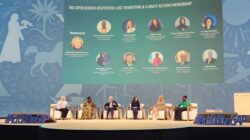
At a flagship event of COP28’s Gender Equality Day, Amb. Melanne Verveer moderated a high-level ministerial dialogue entitled “Gender-Responsive Just Transition and Climate Finance,” organized by the COP28 UAE Presidency and the UNFCCC on Monday, December 4. The ministerial convened two panels of high-level officials across governments and UN agencies to facilitate a dialogue to advance gender-responsive just transitions in the implementation of the Paris Agreement. In addition to the announcement of the Gender-Responsive Just Transitions & Climate Action Partnership from the COP28 Presidency, panelists offered insights on the importance of women’s economic empowerment and job creation in a world increasingly impacted by climate change and environmental degradation. H.E. Razan Al Muarak, UN Climate Change High-Level Champion, remarked, “To deliver a just transition, we must reform the architecture of the global financial system and ensure finance flows to the regions and the people who need it the most. But we must also invest in women’s economic empowerment to ensure no one is left behind.” Panelists also discussed challenges women face in the care economy, accessing sustainable jobs, and making up the majority of the workforce in climate-affected industries, like agriculture. Secretary Hillary Rodham Clinton insightfully rounded out the discussion in her closing remarks, stating, “When prioritized and empowered, women and girls are force multipliers in our efforts to combat climate change and build sustainable economies.”
Watch the full event here.
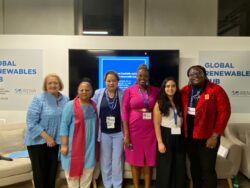
Finally, GIWPS organized a side event with the Global Energy Alliance for People and Planet (GEAPP) entitled, “Achieving an Equitable and Just Transition to Renewable Energy” on Wednesday, December 6. The panel brought together activists and practitioners from India, Kenya, Chile, and Nigeria to discuss the role of inclusion in ensuring the transition to renewable energy sources is equitable and just. They also contributed valuable examples of how women in diverse energy sectors are advancing innovative renewable technologies and economic empowerment. The panel was moderated by Amb. Verveer. In her opening remarks, Former Executive Secretary of the UNFCCC, Patricia Espinosa, emphasized the importance of inclusion, stating, “We are not saying that women or any other marginalized group want to hold up our current transition to renewable energy; quite the opposite. We want it to go further and faster. What we are saying, in no uncertain terms, is [that] we want in.” Panelists went on to demonstrate how including women is already and will continue to accelerate the energy transition. Reema Nanavaty, Head of the Self-Employed Women’s Association of India (SEWA), encouraged efforts to finance women working on the frontlines of climate change and in the informal sector, particularly with the launch of the Global Climate Resilience Fund for women. Naomi Wagura, Director of Solution-Led Countries Africa, discussed the barriers women face in clean energy access and finance in Kenya, as well as the broader region. Constanza Levicán, President of Climatech Chile, predicted how the future of the energy sector may look with the use of Artificial Intelligence and how automation can increase access and inclusion if used intentionally. Olasimbo Sojinrin, COO of Solar Sister, explained how empowering women with clean energy access and solar technology is better for families and communities, saying, “Chickens only eat when there is light. The economic benefit [of renewable energy] is that we were able to put lights in [a woman’s] chicken coop, and that made her four times more successful than any poultry owner around her…the economic benefit of that was astronomical.” Across their remarks, panelists emphasized that for a sustainable and equitable future for all, women and marginalized communities must be given proper resources and support to be included in the renewable energy transition.
A Call to Action
COP28 concluded on December 13, 2023, after two intensive weeks of negotiations, complemented by thousands of climate-related events that took place throughout Dubai. Countries adopted decisions on just transition pathways, a global goal on adaptation, a new collective quantified goal on climate finance, and plans to operationalize the loss and damage fund. Significantly, for the first time since nations began meeting three decades ago to confront climate change, diplomats from nearly 200 countries approved a global pact that explicitly calls for “transitioning away from fossil fuels” like oil, gas, and coal that are dangerously heating the planet. The deal arguably marks the most important global climate moment since the 2015 Paris Agreement, which established a goal of keeping the Earth’s warming below 1.5 degrees Celsius (2.7 degrees Fahrenheit). While there were vigorous objections from SIDS’ delegates—largely shared by top climate scientists—who had advocated for stronger language requiring a phaseout on fossil fuels, this pact sets an important precedent for bolder commitments to transition away from fossil fuels moving forward.
Seeking to ensure that women’s livelihoods are protected during the anticipated transition to a low-carbon and green economy ushered by these agreements, the Gender-Responsive Just Transitions and Climate Action Partnership announced at COP28 includes a series of commitments to support women’s economic empowerment. Everywhere across the globe, women and girls are already playing key roles in climate change action, including renewable energy, nature conservation, and disaster risk reduction. There is also growing evidence that involving women in policy development, peacebuilding, and environmental programming leads to more successful and sustained outcomes. As GIWPS has long advocated, promoting women’s leadership, including socially just and gender transformative measures, and including women from climate-vulnerable and fragile communities in the discussion, will effectively lead the way to climate justice for all.
